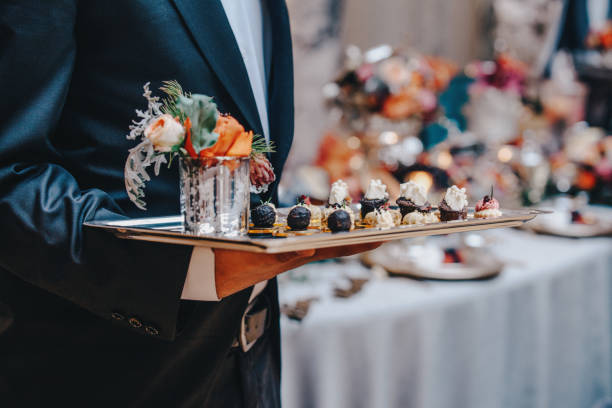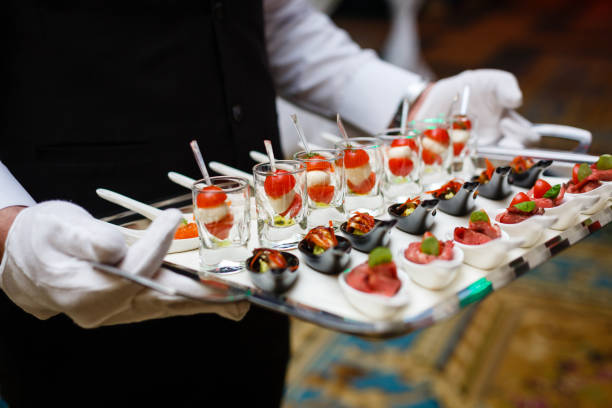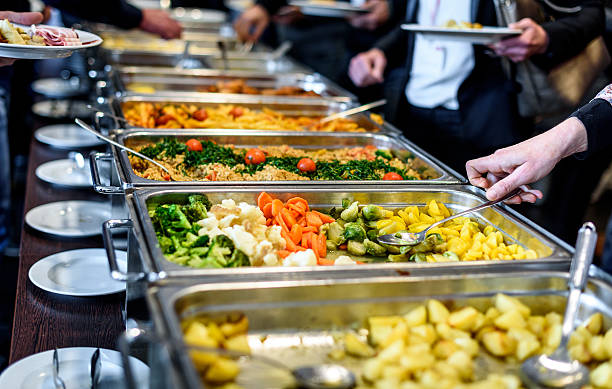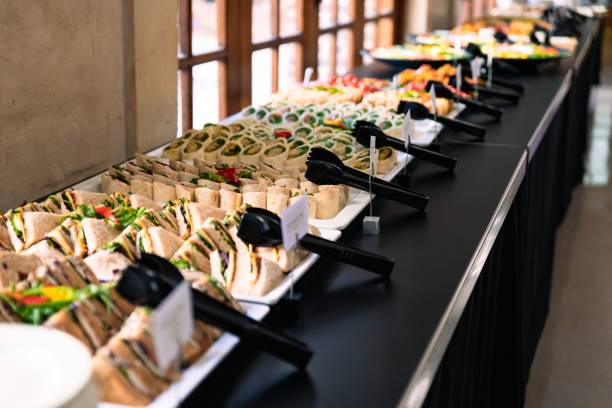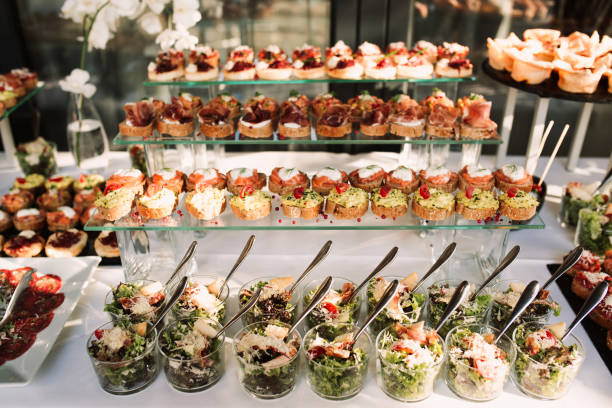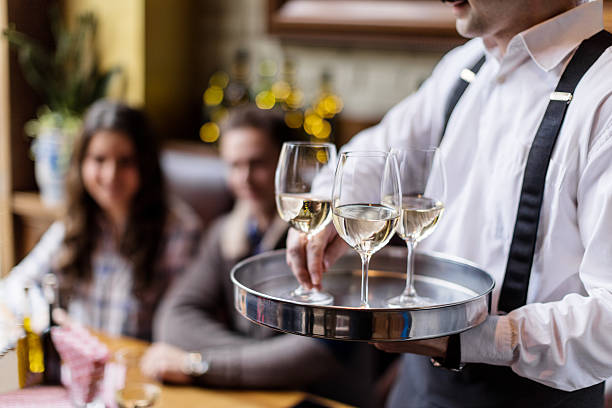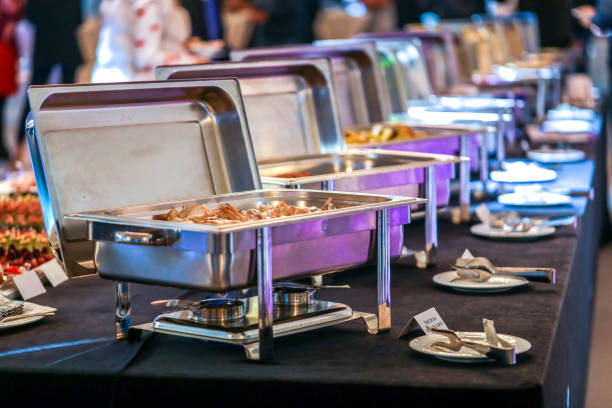
When planning a wedding, one of the most significant decisions couples face is choosing between party trays and full-service catering. Both options cater to the needs of wedding receptions but differ in terms of service, cost, and guest experience. Here’s a breakdown to help you make an informed choice.
Party Trays from a Catering Company in Alexandria, VA
- Appetizer platters (e.g., cheese boards, charcuterie trays)
- Main course trays (e.g., pasta dishes, chicken entrees)
- Dessert platters (e.g., mini cupcakes, cookies)
- Finger foods (e.g., sliders or wraps)
Party trays are ideal for smaller gatherings or informal receptions where self-service is preferred. They allow guests to enjoy food at their own pace without the need for professional servers.
Full-Service Wedding Catering in Alexandria, VA: What You Need to Know
- Customizable menus tailored to dietary requirements
- Professional servers and bartenders
- Presentation and decorative setup (e.g., centerpieces on buffet stations)
- Cleanup services post-event
This approach is perfect for formal weddings where attention to detail and guest experience are paramount.
Comparing Party Trays vs. Full-Service Catering
| Feature | Party Trays | Full-Service Catering |
| Cost | More budget-friendly | Higher cost due to added services |
| Setup Time | Minimal | Significant; staff involved |
| Guest Experience | Casual | Formal |
| Customization Options | Limited | Highly customizable menus |
| Staffing Requirements | None required | Servers and bartenders included |
Pros of Party Trays
- Cost-effective for couples on a budget.
- Easy-to-manage option with minimal involvement from professionals.
- Flexibility in choosing pick-up or delivery options based on your schedule.
Cons of Party Trays
- Requires guests to serve themselves, which may not suit all wedding themes.
- Presentation may lack formality compared to a staffed catering service.
- Limited customization options can make it difficult to address dietary restrictions.
Pros of Full-Service Catering
- Offers an elevated dining experience with professional service.
- Reduces stress for the couple by handling setup and cleanup.
- Provides highly customizable menu offerings suitable for diverse guest preferences.
Cons of Full-Service Catering
- Comes with higher costs due to staffing and additional features.
- Requires close coordination with the catering team during planning stages.
- May have longer lead times for booking due to demand.
Choosing between party trays and full-service wedding catering comes down to your budget, wedding theme, guest preferences, and personal priorities as a couple. Understanding these differences ensures you select an option that aligns seamlessly with your vision for the big day while balancing practicality with elegance.
Comprehensive Guide to Catering Alexandria, VA: Choosing Between Party Trays and Full-Service Options
When planning a wedding, food is one of the most crucial aspects to consider. The catering service you choose can set the tone for the event, enhance your guests’ experience, and align with your budget. Two popular options are party trays and full-service wedding catering. Each has its benefits and drawbacks depending on the style, size, and logistics of your wedding. Here’s a detailed guide to help you decide between these two options.
What Are Party Trays?
Party trays are pre-prepared platters of food that are designed for easy serving. They come in various types such as:
– Appetizer trays (e.g., cheese boards, charcuterie platters)
– Main course trays (e.g., pasta dishes, roasted meats)
– Dessert trays (e.g., cupcakes, brownies)
These options are typically self-serve or placed on buffet tables for guests to help themselves.
What Is Full-Service Wedding Catering?
Full-service catering includes a comprehensive approach where caterers manage almost every detail of your reception dining experience. This often involves:
– On-site chefs preparing fresh meals
– Wait staff serving plated courses or manning buffet stations
– Set-up and clean-up services
– Menu customization tailored to dietary preferences and themes
Key Considerations When Choosing Between Party Trays and Full-Service Catering
- Party Trays: More affordable since there’s no need for service staff or extensive preparation costs. Ideal for smaller or casual weddings.
- Full-Service: Higher costs due to staffing needs but provides an elevated dining experience.
- Party Trays: Best suited for informal settings where guests can serve themselves at their convenience.
- Full-Service: Offers a more polished experience with plated meals or elegant buffet setups managed by professionals.
- Party Trays: Requires minimal set-up but may necessitate additional rentals like warming stations or utensils.
- Full-Service: Handles logistics entirely—from table setting to meal delivery—reducing stress on the couple.
- Party Trays: Limited menu flexibility as items are often pre-selected.
- Full-Service: Allows for personalized menus that reflect the couple’s tastes and accommodate dietary restrictions.
- Party Trays: Creates a laid-back atmosphere perfect for intimate gatherings.
- Full-Service: Elevates the event’s sophistication with professional presentation and service.
| Aspect | Party Trays | Full-Service Catering |
| Cost | Budget-friendly | Higher investment |
| Guest Interaction | Self-serve | Staff-assisted service |
| Set-Up & Clean-Up | Minimal | Handled by caterers |
| Customization | Standard offerings | Highly customizable |
| Event Scale | Suitable for small/casual weddings | Works well for large/formal events |
When Should You Choose Party Trays?
Opt for party trays if:
1. Your wedding is relatively small with fewer than 50 attendees.
2. You’re hosting an informal reception like a backyard or beach wedding.
3. You want a cost-effective option while still offering delicious food choices.
When Should You Choose Full-Service Catering?
Consider full-service catering if:
1. Your guest list exceeds 50 people, requiring seamless coordination during meal service.
2. Your vision includes an upscale reception with premium courses served professionally. 3. You prefer minimal involvement in managing food-related logistics on your big day.
Selecting between party trays and full-service catering ultimately depends on your priorities as a couple—balancing budget, guest preferences, and the overall aesthetic you envision for your special day.
Pros and Cons of Full-Service Wedding Catering in Alexandria, VA
When planning a wedding, the choice of catering style plays a significant role in shaping the overall experience of your special day. Full-service wedding catering is often selected for its elegance and convenience, but it’s essential to weigh its advantages and disadvantages before making a decision. Below is an in-depth look at what full-service catering offers.
Advantages of Full-Service Wedding Catering
- A full-service catering team handles everything—from setting up tables to plating dishes—ensuring seamless execution.
- Professional servers provide a polished dining experience, adding sophistication to your wedding reception.
- Full-service caterers typically offer customizable menus tailored to dietary preferences, cultural influences, or specific themes.
- Couples can enjoy everything from plated dinners to interactive food stations or buffets.
- The caterer manages all aspects of food preparation, serving, and cleanup so you can focus on enjoying your day.
- They also bring their own equipment such as serving trays, chafing dishes, and utensils.
- With professional staff attending to guests’ needs throughout the event, everyone feels well cared for.
- Services like wine pairings or curated dessert courses elevate the overall experience.
- Many full-service caterers provide packages that include complementary services such as beverage management or even event rentals like linens and centerpieces.
Disadvantages of Full-Service Wedding Catering
- Full-service catering is often more expensive than DIY setups or party trays due to its comprehensive nature.
- Additional staffing for servers and bartenders adds to the overall cost.
- Some full-service caterers may require exclusive use of their services, limiting your ability to bring in outside vendors for specific items such as cakes or desserts.
- Coordinating with a caterer on menu tasting sessions and service style can take extra time compared to simpler options like party trays.
- Depending on guest count and venue size, too many staff members could make the event feel crowded rather than intimate.
Comparing Costs: Party Trays vs Full-Service Wedding Catering
| Feature | Party Trays | Full-Service Catering |
| Cost | Lower | Higher |
| Staffing | Self-serve | Provided by caterer |
| Menu Customization | Limited | Extensive |
| Guest Experience | Moderate | Elevated |
| Cleanup Responsibility | Host | Caterer |
Factors to Keep in Mind
- Guest Count: If you are hosting a large wedding, full-service catering typically ensures smoother operations.
- Venue Requirements: Some venues may require professional caterers instead of self-catering options for liability reasons.
- Budget Constraints: Assess how much you’re willing to allocate toward food versus other aspects like décor or photography.
- Theme Consistency: Opting for full-service allows better alignment with formal or upscale wedding themes.
By carefully analyzing these advantages and disadvantages, couples can decide if full-service wedding catering fits their vision while considering logistical needs and budgetary constraints.
What to Consider When Selecting Party Trays or Boxed Meals for Your Wedding Reception
When planning a wedding reception, food is often one of the most important components to get right. For couples looking for a more casual or cost-effective catering solution, party trays and boxed meals are often popular options. However, there are several factors to consider before making this decision to ensure that your guests enjoy the experience.
Guest Preferences and Dietary Restrictions
Your guest list will play a significant role in determining whether party trays or boxed meals are suitable options:
– Dietary Needs: Ensure that your catering provider offers flexible menu options for guests with dietary restrictions such as vegetarian, vegan, gluten-free, or allergen-friendly meals.
– Portion Sizes: Party trays allow guests to serve themselves, which can be beneficial for those with varying appetites. Boxed meals, on the other hand, offer pre-portioned servings. If your guest list includes a mix of big eaters and light grazers, keep this in mind when deciding between the two.
Style of Wedding Reception
The overall style and formality of your wedding reception should align with your food choices:
– Formal Events: If you’re hosting a formal sit-down dinner with structured timelines, boxed meals may not provide the elegance or sophistication required for such an event.
– Casual Gatherings: Party trays work well for buffet-style receptions or casual celebrations where guests can socialize while choosing their preferred dishes at their own pace.
Pros and Cons of Party Trays
| Advantages | Disadvantages |
| Wide selection of dishes | May create food waste if over-ordered |
| Guests can customize portions | Requires serving utensils and cleanup |
| Perfect for buffet setups | May lead to longer wait times at food stations |
Pros and Cons of Boxed Meals
| Advantages | Disadvantages |
| Easy distribution | Limited ability for customization |
| Minimizes serving time | Perceived as less elegant at formal settings |
| Simplifies portion control | May not offer variety for guests |
Costs and Budget Considerations
Cost-efficiency is often a priority when planning wedding catering:
– Party trays tend to be more affordable per guest because they allow bulk preparation by the caterer. However, you might need additional servers if you opt not to have self-service.
– Boxed meals typically cost more due to individual packaging but reduce additional labor costs since they don’t require on-site serving staff.
Venue Logistics
Your choice should also take into account the venue’s setup: – If space is limited, boxed meals may be better suited as they don’t require large buffet tables. – On the other hand, venues equipped with ample space might lend themselves well to arranging multiple party tray stations that encourage mingling among guests.
By carefully considering these factors—including guest preferences, event style, budget constraints, and venue logistics—you’ll be better positioned to determine whether party trays or boxed meals best suit your wedding reception needs.
Exploring Celebration Packages Offered by Wedding Caterers
When planning a wedding, catering plays a significant role in ensuring that your guests enjoy their meals and leave with lasting memories of your special day. Many wedding caterers offer celebration packages designed to simplify the planning process while meeting a variety of tastes and preferences. These packages often combine menu customization, additional services, and flexible options to suit different styles of weddings. Below, we’ll dive into what these celebration packages typically include and how to choose the right one for your big day.
Key Features of Wedding Catering Celebration Packages
- Menu Customization:
Couples can select from pre-designed menus or work directly with the caterer to create a custom menu that aligns with their tastes and dietary preferences. - Multiple Course Options:
Packages may include appetizers, entrees, desserts, and late-night snacks. Some also offer buffet-style or plated service options. - Beverage Services:
Many packages come with beverage options such as open bars, signature cocktails, wine pairings, or non-alcoholic drink stations. - Event Staffing:
Full-service catering packages often include professional staff such as servers, bartenders, chefs on-site, and event coordinators. - Tableware and Décor:
High-end packages may provide table linens, glassware, flatware, centerpieces, and even themed décor that matches your wedding style. - Setup and Cleanup Services:
Caterers often handle all aspects of setup before the event begins and cleanup once it concludes.
Benefits of Choosing Celebration Packages
- Convenience: By bundling multiple catering services together (e.g., food preparation, service staff), couples save time searching for separate vendors.
- Cost Efficiency: Many caterers offer discounts on bundled services within their celebration packages compared to booking individual items.
- Professional Execution: With experienced staff managing logistics such as food preparation schedules or bar operations during the event, couples can relax knowing everything is handled.
- Tailored Experiences: Packages allow personalization so you can reflect your tastes or cultural traditions in every detail of the meal service.
Tips for Selecting the Right Package
- Define Your Budget Early On:
Determine how much you’re willing to allocate toward food-related expenses upfront so you can narrow down package options accordingly. - Request Tasting Sessions:
Many providers offer complimentary tastings so you can sample menu items before committing to any specific package. - Ask About Flexibility:
Check if modifications are allowed within standard offerings (e.g., substituting seafood dishes due to allergies). - Verify Guest Count Adjustments:
Ensure that pricing adjustments are clear for last-minute changes in guest numbers on both small-scale intimate ceremonies or larger celebrations alike. - Review Contract Details Thoroughly:
Look out for hidden costs like delivery fees outside primary venues listed along terms dictating gratuity rates applicable after final billing statements issued post-event completion date agreed upfront signed agreements legally binding contracts governing arrangements processed ahead bookings confirmed finalized execution stages occur seamlessly avoiding disputes arising misunderstandings provisions therein referenced document outlines stipulations enforcement mechanisms address unforeseen contingencies emerge operational flow dynamics logistics smoothly handled professionals ensuring satisfaction outcomes guaranteed!
Common Comparison Table Example
| Feature | Standard Package | Premium Package | Customizable Package |
| Menu Items | Pre-set Options | Expanded Menu Choices | Fully Customizable |
| Beverage Service | Soft Drinks Only | Open Bar Options | Tailored Drinks Menu |
| Staffing Included | Limited | Full-Service Team | Flexible Staffing Plans |
| Décor Elements | Basic Table Settings | Coordinated Décor Themes | Complete Personalization |
How to Maximize Freebies When Booking a Wedding Catering Service
Planning a wedding can become costly, but there are smart ways to make the most of your investment. Many couples overlook the potential freebies or discounts that wedding catering services might offer. By knowing how to negotiate and ask the right questions, you can maximize what you get from your caterer without exceeding your budget.
Ask About Complimentary Tastings
- Schedule strategically: Book tastings with multiple caterers within the same timeframe so you can compare options effectively.
- Evaluate portion sizes: Treat this as an opportunity to analyze whether their portions align with your guest list needs.
- Request variety: Ask if they’ll let you sample a diverse range of menu items beyond just main courses.
Inquire About Free Add-ons
- Free cake cutting services
- Complimentary appetizers or bread baskets
- Beverage stations (e.g., coffee, tea, or infused water)
- Upgraded china, cutlery, or table linens at no extra charge
By negotiating thoughtfully, these add-ons can enhance your event without inflating costs.
Look for Seasonal Promotions and Discounts
| Promotion Type | What to Watch For |
| Off-season discounts | Lower rates for weddings held in winter or midweek |
| Early bird deals | Reduced costs for booking 6–12 months in advance |
| Referral incentives | Discounts when referred by other vendors (e.g., florists) |
Plan ahead to take advantage of these offers while securing quality service.
Package Customization Opportunities
- Swap premium items for equally delightful but lower-cost alternatives.
- Combine food stations with plated meals instead of choosing one over the other.
- Opt for buffet-style service instead of individual plates if suitable for your guest count.
Caterers often appreciate flexibility and will work with you to create an arrangement that balances affordability with elegance.
Leverage Vendor Relationships
- Discounted bar setups
- Reduced delivery fees for rentals like chairs and tables
- Shared cost savings on venue logistics
This approach not only saves money but ensures seamless coordination across all aspects of your special day.
Maximizing freebies when booking a wedding catering service requires communication and research. By understanding what is available and confidently negotiating terms, couples can elevate their reception experience without unnecessary expenses.
Understand Payment Terms and Deposit Policies
- Deposits: Most caterers require a deposit to secure their services. This is often non-refundable and typically ranges from 25% to 50% of the total estimated cost.
- Payment Schedule: Familiarize yourself with the provider’s payment structure. Some demand full payment before the event, while others may allow staggered payments leading up to your wedding day.
- Cancellation Policy: Life is unpredictable; therefore, it’s crucial to know what happens if plans change. Review refund policies and any fees that may apply if you need to cancel or reschedule.
Confirm Minimum Guest Counts
Many catering services have minimum guest count requirements. If your guest list falls below this number, you may still be charged for the minimum headcount: – For larger weddings: Most full-service caterers require at least 50–100 guests. – For smaller gatherings: Party tray or boxed meal providers often have lower minimums (e.g., 20–30 servings).
Plan accordingly if your numbers fluctuate close to these thresholds.
Request a Detailed Proposal/Contract
A comprehensive contract protects both you and the catering company by clearly outlining expectations. The proposal should include:
– A breakdown of menu items with pricing per person or package rate.
– Additional costs such as labor (servers, chefs), rental equipment (tables, linens), gratuities, taxes, and travel fees (if applicable).
– Specific timelines—this includes setup times, meal service duration, and teardown schedules.
Finalize Your Guest Count on Time
Catering companies usually ask for a final headcount at least 1–2 weeks before your event date. Providing this information late could result in:
1. Service delays. 2. Insufficient food quantities. 3. Additional “last-minute order” surcharges.
Be mindful of deadlines set by your caterer.
Account for Dietary Restrictions and Allergies
Weddings often host diverse groups of people with varying dietary needs or allergies—these must be communicated early in the process: – Provide a list of allergies (e.g., nuts, shellfish) or requests such as gluten-free or vegan options. – Ask if they can prepare special meals for children or staff like photographers and DJs who might need simpler dishes.
Schedule Menu Tastings in Advance
Before finalizing anything, ask for a tasting session; this ensures that what looks good on paper tastes just as amazing in reality: – Many caterers offer complimentary tastings once you’re seriously considering booking them. – Some may charge a fee but will deduct it from your final bill if you move forward with their services.
Verify Event Setup Services Included in Pricing
Not all catering agreements include setup-related tasks. Clarify roles and responsibilities:
| Task | Caterer Responsible? | Additional Fee? | |—————————|———————-|—————-| | Setup of tables/chairs | Yes/No | Yes/No | | Arrangement of place settings | Yes/No | Yes/No | | Cleanup after dinner | Yes/No | Yes/No |
Understanding these details upfront minimizes surprises later.
Ask About Leftover Food Policies
Couples often wonder about leftover food after an event—some caterers allow clients to take leftovers home while others follow strict disposal practices due to liability concerns under food safety laws: 1. Ask whether leftover food can be packaged for guests or donated. 2. Ensure proper storage containers are provided if needed.
By addressing these critical topics during consultations with potential caterers, you’ll avoid misunderstandings while ensuring that every aspect aligns perfectly with your vision for your special day!
- Important Questions to Ask Alexandria, VA Caterers for Your Perfect Wedding Day
- Understanding Alexandria, VA Caterers: Party Trays vs. Full-Service Wedding Catering
- Essential Tips Every Couple Should Know About Alexandria, VA Catering for Weddings
- 11 Must-Know Questions to Ask Your Wedding Caterer for Perfect Catering Alexandria, VA Events
- Planning the Perfect Wedding Reception with Catering Alexandria, VA
- 20 Essential Questions to Ask Before Booking Alexandria, VA Catering for Your Wedding
- 8 Essential Tips for Planning Wedding Catering with Alexandria, VA Caterers
- Essential Questions to Ask Alexandria, VA Caterers for a Perfect Event
